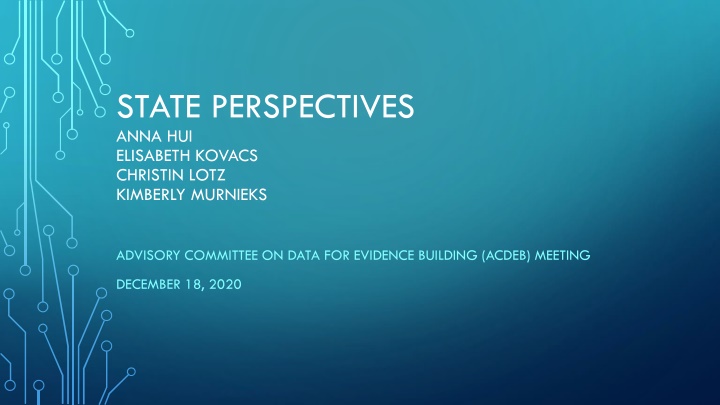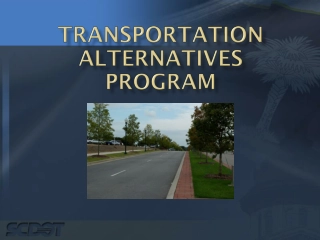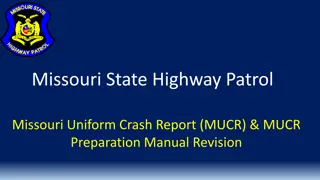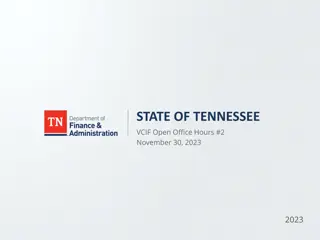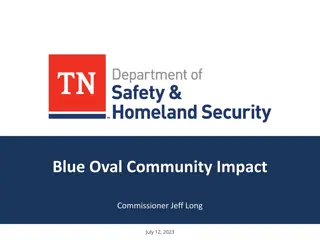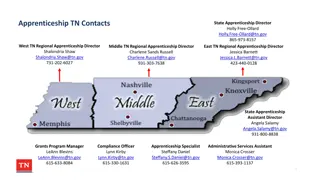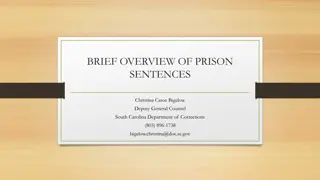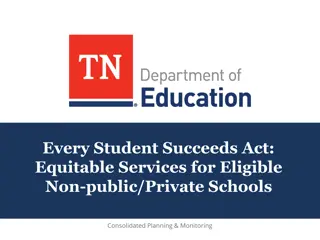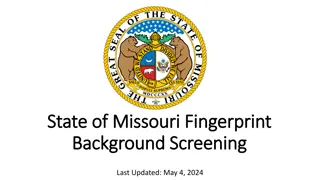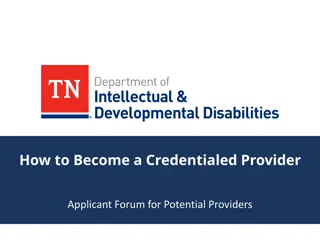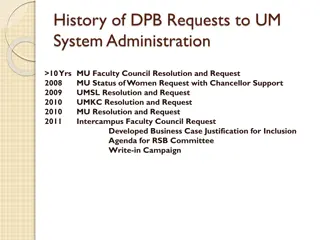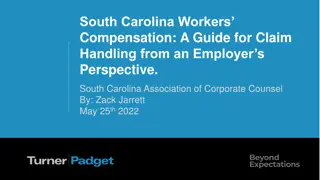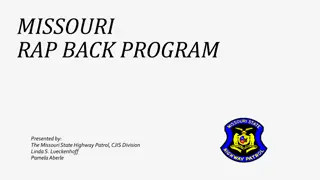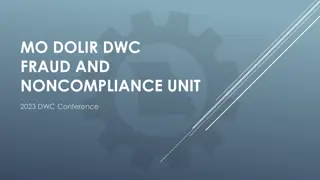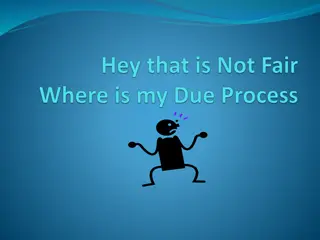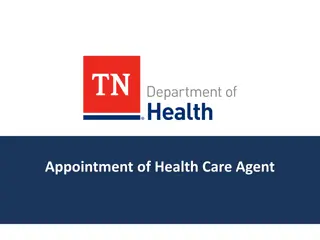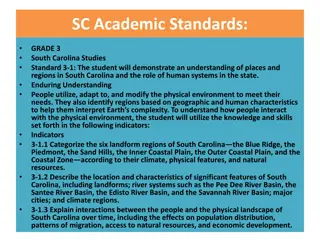State Perspectives on Evidence: Insights from Missouri, South Carolina, Tennessee, Ohio
How states like Missouri, South Carolina, Tennessee, and Ohio leverage evidence and data in their decision-making processes. Learn about the unique considerations and organizational structures that drive evidence-based practices in each state.
Uploaded on Mar 12, 2025 | 0 Views
Download Presentation

Please find below an Image/Link to download the presentation.
The content on the website is provided AS IS for your information and personal use only. It may not be sold, licensed, or shared on other websites without obtaining consent from the author.If you encounter any issues during the download, it is possible that the publisher has removed the file from their server.
You are allowed to download the files provided on this website for personal or commercial use, subject to the condition that they are used lawfully. All files are the property of their respective owners.
The content on the website is provided AS IS for your information and personal use only. It may not be sold, licensed, or shared on other websites without obtaining consent from the author.
E N D
Presentation Transcript
STATE PERSPECTIVES ANNA HUI ELISABETH KOVACS CHRISTIN LOTZ KIMBERLY MURNIEKS ADVISORY COMMITTEE ON DATA FOR EVIDENCE BUILDING (ACDEB) MEETING DECEMBER 18, 2020
AGENDA Briefing Structure How we look at evidence How we are organized for evidence and data Our state-specific considerations 1. Missouri -- Anna Hui 2. South Carolina -- Elisabeth Kovacs 3. Tennessee -- Christin Lotz 4. Ohio -- Kimberly Murnieks 5. Overall State Level Challenges & Issues
MISSOURI ANNA HUI How We Look at Evidence During the annual budget process, the Office of Administration Office of Budget and Accounting requires state agencies to provide both financial and program performance metrics in the budget submissions. Budget Explorer - https://oa.mo.gov/budget-explorer State s COVID response has relied heavily on data to support emergency declarations and next steps; evidence is utilized daily in statewide COVID Fusion Cell discussions; Show Me Strong Recovery interactive website provides data transparency on public health, economy and social impact - https://showmestrong.mo.gov/data/
MISSOURI ANNA HUI How We Are Organized in Our State For Evidence and Data Decentralized - Each agency has specific program requirements for data collection and reporting according to state and federal statutes. State Chief Information Officer (CIO), under the Office of Administration, guides data security and usage from IT perspective, works with Governor s Office and Cabinet agencies on planning future state for data governance and organization for state; state legislators have proposed creating a State Data Officer role under State CIO Missouri Economic Research and Information Center (MERIC) under the Missouri Department of Higher Education and Workforce Development (DHEWD) serves as the state s labor market information shop Missouri Data Governance Committee was created with the Workforce Data Initiatives (WDI) federal grant to improve collection and data-sharing; resulted in creation of the Missouri Score Card and Wage Finder application
MISSOURI ANNA HUI Our State-Specific Considerations Since 2018, Missouri has partnered with the Coleridge Initiative to train State of Missouri staff through their Applied Data Analytics Program. Training covered core data analytics techniques by working on specific projects using real- world micro-data. During this training, students have access to the Administrative Data Research Facility (ADRF) which provides a secure platform to host confidential micro-data. The ADRF is designed to promote collaboration, facilitate documentation, and provide information about use to data stewards. Missouri is considering using the ADRF for expanding internal data analytics. In 2019, Missouri partnered with Illinois, Indiana, Ohio and Kentucky to form the Midwest Data Collaborative with the intent to create a regional data-sharing framework. A variety of research partnerships exist with the University of Missouri system as well as other private higher education institutions, like the Washington University in St. Louis
SOUTH CAROLINA ELISABETH KOVACS How We Look at Evidence Policy and budget decisions are made based on data analysis. Individual agencies utilize various data systems to collect, disseminate and analyze their own data. Opportunity for a better mechanism for data administration for workforce and education to better align training and industry needs.
SOUTH CAROLINA ELISABETH KOVACS How We Are Organized in Our State For Evidence and Data Mostly decentralized; however healthcare data is centralized within our Office of Revenue and Fiscal Affairs.
SOUTH CAROLINA ELISABETH KOVACS Our State-Specific Considerations Governance Policy Advancing data governance among stakeholders. Understanding actual versus the perceived restrictions in sharing data. Data Sharing Process Management Identifying and prioritizing initiatives mutually beneficial to stakeholders. Information Technology More efficient ways to inventory, document and manage data with an emphasis on data security. Data Sharing Outcomes and Evaluation Metrics 8
TENNESSEE CHRISTIN LOTZ How We Look at Evidence Inventory the Base Budget: Determine what programs we fund, how much funding there is for each, and their level of evidence. Include Evidence in Cost Increase/Reduction Plans: Provide a tool for departments to use that explains the level and type of evidence tied to cost increases. Streamline Data Management to Improve Data Usage: Improve the ability for agency data sets to speak to one another in order to answer meaningful questions about program impact.
TENNESSEE CHRISTIN LOTZ How We Are Organized in Our State For Evidence and Data Evidence centralized with the Office of Evidence and Impact Data collection and analysis at agency level currently Transparent TN dashboards https://openmaps.tn.gov/
TENNESSEE CHRISTIN LOTZ Our State-Specific Considerations Focused on data sharing between executive branch agencies Overcoming barriers to data sharing Maintaining privacy and security Data analytics at the enterprise level 11
OHIO KIM MURNIEKS How We Look at Evidence Ohio reviews data as part of our state budget planning process State law allows for program performance reviews by the Office of Budget and Management State agencies submit notable statistics as part of their budget requests Individual agencies conduct program performance reviews and evaluations Ohio recently established the data.ohio.gov data portal to bring together our data, research, and reports to drive meaningful insights and results
OHIO KIM MURNIEKS How We Are Organized in Our State For Evidence and Data InnovateOhio = data governance and common data technology platform InnovateOhio is established in state law within the Governor s Office and is led by our Lieutenant Governor Dashboards managed by agencies including Ohio Checkbook interactive budget site https://checkbook.ohio.gov/ COVID Dashboard https://coronavirus.ohio.gov/wps/portal/gov/covid-19/dashboards Unemployment Claims Dashboard https://ui-claims.chrr.ohio-state.edu/ All accessible through https://data.ohio.gov/wps/portal/gov/data/home
OHIO KIM MURNIEKS Our State-Specific Considerations IT optimization and centralization IT innovation Digital experience Data analytics Shared services and collaboration All focused on leveraging data and technology to better serve Ohioans 14
Lack of Incentives Culture of Government Data Social Impact Federal government has only recently required data in federal funding. Government programs are often linear, focused on one population or one outcome. Public distrust of protected data due to numerous instances of data vulnerability. OVERALL STATE-LEVEL CHALLENGES & ISSUES Lack of federal inter-agency data sharing. Natural protective instinct of my own agencies data. Fear of big brother managing individuals through data. Additional resources to integrate state data sources moves state decision. Natural tendency to make decisions that minimize risk rather than maximize outcomes. Privacy and security concerns No standardized reporting framework (data definitions) at the federal level and required different times of the year (PY, FY, State FY, etc). Federal laws that deter or prevent cross-agency data sharing Legacy data systems Balancing compliance and results
